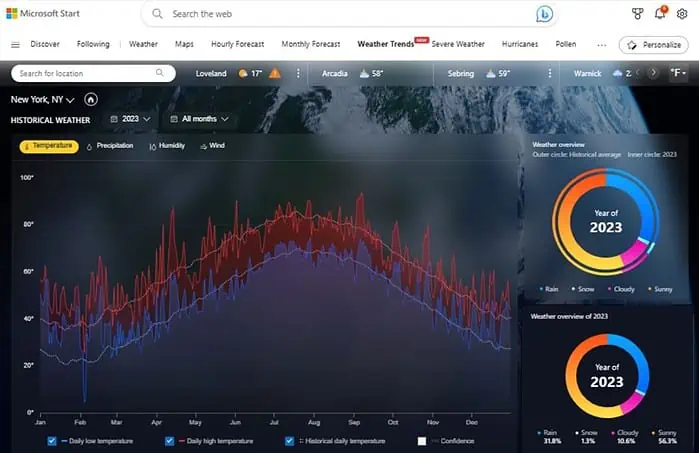What's Microsoft Start's new AI for more accurate monthly weather forecasts?
2 min. read
Published on
Read our disclosure page to find out how can you help MSPoweruser sustain the editorial team Read more
Key notes
- Microsoft Start is exploring AI models for weather forecasting, potentially leading to more accurate 30-day predictions.
- Their AI ensemble outperforms traditional methods in short-term forecasts, showing promise for improved accuracy.
- AI models operate faster and more efficiently, enabling more frequent simulations and better probabilistic forecasts.

Research from Microsoft’s Weather team shows that AI models hold substantial potential for improving weather forecasts, particularly for shorter timeframes. This comes after last month, Microsoft Start’s new Weather Trends page started offering historical weather data.
Their study compared five AI models trained on vast weather datasets to the European Centre for Medium-Range Weather Forecasts (ECMWF) current state-of-the-art system.
The results show that Microsoft’s AI gets to outperforms ECMWF in temperature predictions for the first week by 17%. This improvement is because of the AI’s ability to identify complex patterns within weather data, hence leading to more precise short-term forecasts.

These AI models operate with much more efficiency compared to traditional methods. How? Their reduced computational requirements lets more frequent simulations, which then leads to more useful probabilistic forecasts that better account for inherent weather uncertainties.
While AI excels at short-term predictions, the study also shows that the glass isn’t always greener; the value of combining it with established forecasting techniques like ECMWF’s ensemble. This hybrid take gives out the most accurate long-range forecasts (up to one month).
It’s important to note that the inherent predictability of a specific location’s weather remains a crucial factor in determining forecast accuracy, regardless of the model employed.
Overall, Microsoft’s research paves the way for advancements in weather forecasting, with AI offering bug potential for improved accuracy, speed, and efficiency, particularly for longer timeframes. This has the potential to benefit various sectors that rely heavily on weather predictions, from agriculture and aviation to disaster preparedness.
More here.








User forum
0 messages